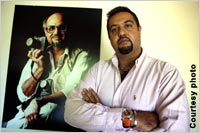The U.S. hopes that talks in Geneva start “a serious process” to address Iran’s nuclear activity. There’s a new place for cultural exchange in Indonesia. U.S. officials are in Mexico for the COP-16 climate meeting. In Africa, momentum is growing for business and investment. The U.N. is accepting video submissions about the biggest challenges facing the younger generation. And, we’ve got two reports on journalists from around the world visiting the U.S. under a State Department-backed program.
U.S. Hopes for Serious Talks With Iran
(mobile version)
The Obama administration hopes that meetings in Geneva between representatives of Iran and China, Russia, France, the United Kingdom, the United States and Germany, collectively known as the P5+1, mark the beginning of “a serious process” to address the global concerns over Iran’s nuclear activities. The talks will continue in late January 2011 in Istanbul, Turkey.
In Indonesia, @america
(mobile version)
In Indonesia, Under Secretary of State for Public Affairs and Public Diplomacy Judith McHale recently attended the opening of the new U.S. cultural center — @america. The center aims to expand engagement between young Indonesians and young Americans through interactive games and live events. McHale described @america as “what we hope will be the first of a new generation of American cultural centers.”
U.S. Officials at COP-16
(mobile version)
With a record $90 billion in renewable energy investments under way, the United states is pushing hard to reduce its dependency on fossil fuel, Energy Secretary Steven Chu tells a gathering at the COP-16 climate change meeting in Cancún, Mexico.
Africa’s Business Momentum
(mobile version)
Business momentum is building across Africa and the rest of the world is starting to notice, says Murray B. Low, a professor at Columbia University’s Business School.
Voices of a New Generation U.N. Challenge
(mobile version)
Until December 14, the U.S. Mission to the United Nations is accepting videos and written submissions from young people around the world who respond to question: “What is the most vital challenge to international peace and security facing your generation? Tell the UN Security Council what issue you believe deserves more attention, and explain why it is important.” Selected submissions will be incorporated into the agenda of the Security Council event on December 21.
 Asian Journalists Visit America
Asian Journalists Visit America
(mobile version)
A dozen journalists from South and Central Asia spent three weeks in the United States as part of the Edward R. Murrow Program. Krita Raut, left, a reporter at The Himalayan Times, says the experience was particularly valuable for her because the restoration of democracy and press freedom in Nepal are so recent that the media have had little chance to cover an election.
Democracy and the Free Press
(mobile version)
Thirteen working journalists from 11 Western Hemisphere nations also got a firsthand look at the important role a free press plays in a democratic society during their time in the United States as participants in the program.


 In Indonesia, @america
In Indonesia, @america International Journalists in the USA
International Journalists in the USA

 A New India-U.S. Partnership
A New India-U.S. Partnership





 Although Pearl was known for his work as a journalist, he was also a mandolin player and a classically trained violinist who used his love of music to make friends across cultural and religious divides. As Michelle
Although Pearl was known for his work as a journalist, he was also a mandolin player and a classically trained violinist who used his love of music to make friends across cultural and religious divides. As Michelle